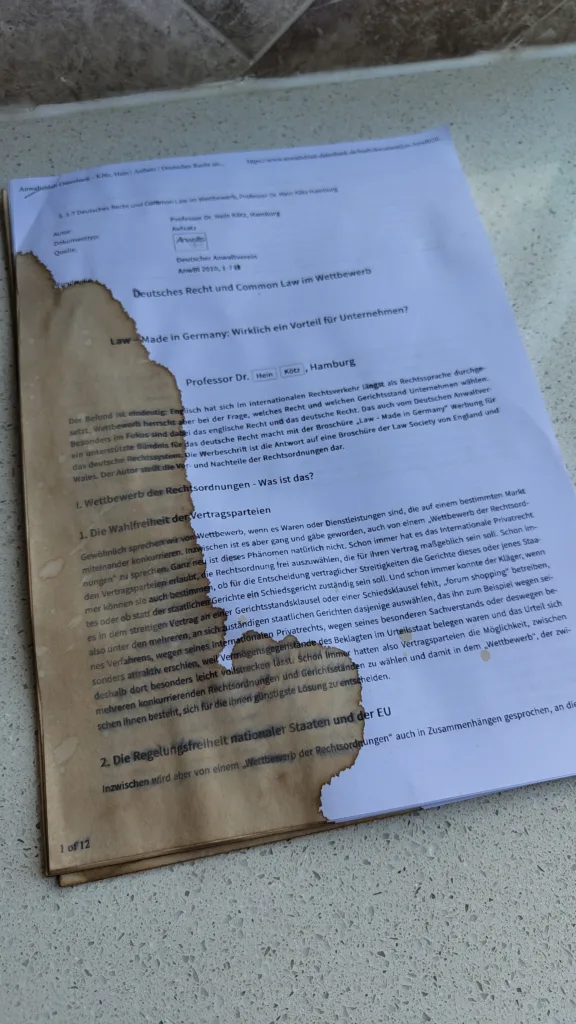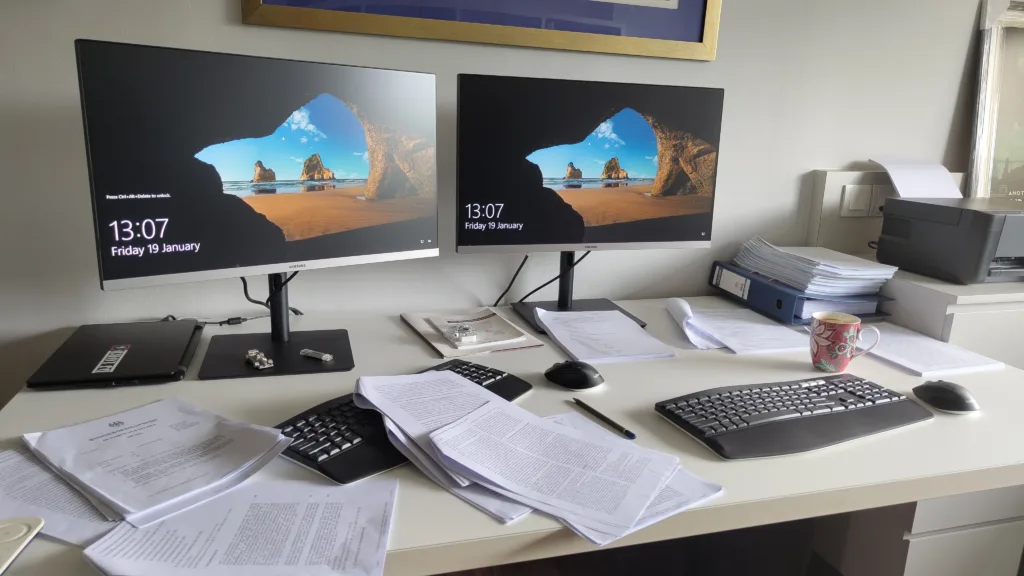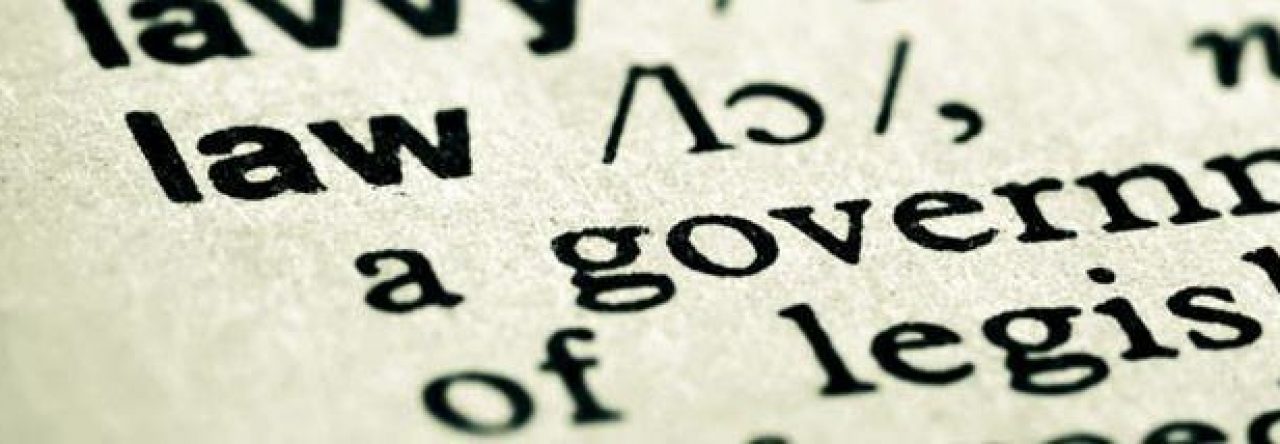If you know me, you know that I don’t always do things in life in the orthodox order. After passing my first state examination in law at the beginning of 2001, I wanted to do a doctorate. In fact, I had already made several preparations for it. But then life intervened and took me from Hamburg to Singapore. Which was fine, and I soon abandoned the idea of becoming a Doctor of Law and concentrated on my second state examination, then my career, and whatever else was happening in my life (which, as life goes, wasn’t all smooth sailing). A while ago, however, I picked up the idea again and pursued it further. Yesterday I was in Munich for my oral doctoral examination at Ludwig Maximilian University (LMU). I’m happy to report: I made it.

Does that mean I am a doctor now? No, not quite yet. According to the regulations of the Faculty of Law, the other, main part of the doctorate, my dissertation, still has to be published, and then some. But that is in the making [update: on 29 April 2024 I was granted the right to call myself a doctor]. In case it is of interest to any esteemed reader, the title of the dissertation is:
‘SICC or Arbitration? A Comparison of Proceedings in the Singapore International Commercial Court with the Advantages and Disadvantages of International Arbitration Proceedings’,
or, in the original German:
„SICC oder Schiedsgericht? Ein Vergleich des Verfahrens vor dem Singapore International Commercial Court mit den Vor- und Nachteilen internationaler Schiedsverfahren“.
Quite self-explanatory, isn’t it? More on this when it comes out.
Yesterday’s oral examination took place in the evening after the lectures of my examiners, both professors of law at the Faculty. What a beautiful, prestigious university LMU is (founded in 1472)! But I didn’t stay long, because the next morning I left for Hamburg, my home town, where I will spend the next few days meeting up with family, friends and colleagues. Most importantly, I wanted to visit my mother and tell her what I’d done (which I did about an hour ago, she’s still pretty ecstatic). In fact, very few people knew about this little project I’ve been working on since August 2022. But now that it is mostly in the bag and my mum knows, I feel like telling the rest of the world. If anyone is interested.
The Textbook Chapter on Distribution Law
Soooo. How does one come up with the idea of doing a doctorate at my age? To explain, I have to go back about three years.
Remember when, at the height of the Covid-19 pandemic, we were all forced to do most of our networking online? That’s how I met a German lawyer and university lecturer who, in 2021, asked me if I would like to contribute a chapter on Singapore to the forthcoming fifth edition of the German textbook on distribution law that he co-edited. This textbook has been published by a renowned publishing house since 1994 and is now a standard textbook in the German legal community. The fourth edition was a tome of over two thousand pages, written by dozens of renowned authors. And now they ask me if I want to join their ranks? Of course I said yes!
I then wrote a chapter on agency, commercial agents, distributors, franchising and competition law in Singapore. Hopefully all to the high academic standard for which the textbook is renowned. I submitted my manuscript in June 2022.
The Project Idea
Normally, as a lawyer or an arbitrator, I’m working on a specific case. I love that kind of work, but when I was writing the chapter, it felt great to be looking at the big picture. Now that I had finished it, did I just want to go back?
No, I did not.
And so, on a quiet day in early August 2022, I was sitting in my study and suddenly found myself typing an e‑mail.
Dear Professor X, I am writing to enquire whether you would be willing to supervise my doctoral dissertation. […]
In this e‑mail, I presented the idea of a dissertation on the Singapore International Commercial Court (SICC), a creature that has been in existence since 2015. Given the ongoing discussion about commercial courts in Germany, I thought it would be interesting to take a closer look at how Singapore does it. Plus, I meet the usual requirements of law faculties in Germany for admission as a doctoral student. What could go wrong?
So I sent this e‑mail to a university lecturer I know. Surely, I thought, he would be overjoyed to supervise my doctoral project, whereupon my next step would be…
Instead, less than an hour after I sent the e‑mail, that lecturer had rejected me.
And then another. And another.
Oei!
Realising that it wasn’t going to be that easy, I spent the next two months writing to dozens of university professors. Surprisingly, many did not even reply. Those who did had more or less convincing reasons for rejecting me, so I kept on writing. What is a boy to do.
Then, at the beginning of October 2022, I sent my e‑mail to someone who replied within fifteen minutes that he was interested. My future supervisor had appeared! A day later, another professor I had written to at the same time also expressed interest. How the turntables!
It wasn’t easy to say no to someone who was interested in supervising my dissertation. I really had the right chemistry with both of them. I know the second one would have been a good supervisor too, because he continued to take an interest in my work. We kept in touch, and once he even supplied me with some literature that I found difficult to obtain. But it seemed fair to apply the principle of priority and so I went with the first person. As it turned out, I couldn’t have asked for a better supervisor.
Research Issue Fever
I spent the next two months finding the exact topic and fleshing it out. I wrote a short exposé, which my supervisor approved, and looked into work organisation issues. Among other things, I read this blog on how to do a German legal doctorate from A to Z, phew. I also read the SICC’s Rules of Procedure, the Singapore International Commercial Court Rules 2021, from cover to cover. Yes, all 366 pages. Let’s just say it’s not an activity subject to entertainment tax.
I also started reading relevant literature, still in a rather disorganised way, and thinking about it. Unfortunately I was doing this at night, when I really wanted to sleep. One night I had the flu and was tossing and turning in bed. I was sleepless and feverish, puzzling over the research question and the structure of the dissertation in my mind’s eye. It was very frustrating because I was so ill and could really do with some shut-eye, when suddenly everything fell into place and made sense. It was my very own Kekulé moment. Nice. But now I was so excited about this discovery that I couldn’t sleep for that reason. Anyway, this led to a first outline that my supervisor accepted, after which I could start writing. It was early December 2022.
‘Writing’ is not quite the right word. Although I had never before thought through the structure of a major project in such detail, it was just that: a structure. To fill it with substance, I went section by section, first reading everything about the part I was working on. Then I would sketch out my initial thoughts and put them in the appropriate place in the outline. Later I would usually add more notes. When I realised that I had really read everything that had been written about that part, I sat down in front of this annotated outline and produced a coherent text from it.
In this way, the first chapter, which introduces the SICC and describes the research question, my methodology and approach, wrote itself. There followed a draft of the ‘first main section’ (as my supervisor called it), an overview of the advantages and disadvantages of arbitration specifically in Singapore and Germany. More an exercise in completeness and thoroughness than an intellectual challenge, I interrupted work on it over the Christmas holidays. Back to Germany for the first time since the pandemic. A much-needed break during which I thought about my project, but didn’t work on it. Not one bit.
Administrative Stuff and a First, Incomplete Draft
After returning to Singapore, I continued to ‘write’ the ‘second main section’ in early 2023. I also had to deal with all the administrative stuff that comes with a doctorate. The university wanted me to submit a German police clearance certificate, so I went to the embassy to apply for it and get certified copies of my educational certificates. With these, I applied for admission to the Faculty as a doctoral student. Then came the application for enrolment at the university. Soon after that I was a student again; it’s been a while. But none of it was particularly complicated. In general, I’ve been amazed at how smoothly everything has gone, how accommodating everyone I’ve approached has been. I’m used to bureaucracy and obstacles being put in my way in Singapore.

That’s how the first six months of 2023 passed. I got into the routine of working on my dissertation in basically every free minute. Paid work always came first, though, because one is not a rentier, and besides, this is Singapore, the most expensive city in the world. Part of the routine: morning and afternoon trips to my favourite coffee shop next door. And the digital mixtapes that my eternal basketball coach regularly provided me with (without having any idea what I was working on).
All in all, it was really fun. There were days when I had to take a breather, but that wasn’t very often, so things progressed relatively quickly. In mid-July 2023 I felt like submitting a draft. I knew it was far from finished, but I needed some guidance. Was I still on the right track or had I lost my way somewhere? Better to ask now than later.
More Drafts
My supervisor suggested that I divide the chapter on procedural and professional law, which was initially very large, into two parts: one on the constitution and organisation of the courts and professional law, and another on procedural law. But for reasons I cannot fathom, the size of the procedural chapter grew considerably as I implemented his suggestions. So the next thing my supervisor suggested was that I move more parts of this main chapter into additional sub-chapters. Aye, sir.
By the end of September 2023, I was finally (finally!) ready to move on to the ‘third main section’, the actual research issue, in which I would tie together the first and second parts and examine the extent to which the strengths and weaknesses of arbitration are also present in the SICC. At last, I was able to put into writing all the many aspects that had been on my mind for months – since that feverish night in November 2022, to be precise. Not surprisingly, it didn’t take long, only a month. In my mind this chapter was pretty much written.
At the end of October 2023, I sent the second, now complete, draft to my supervisor. His feedback came just one day later: he suggested only cosmetic changes, which I carefully made.
In the first week of November 2023, my supervisor declared the draft ready for submission. I produced the final version and sent it to him informally in early December. He reviewed it, again informally, just before Christmas. However, further legislative and judicial changes in Singapore had been announced for 5 January 2024, which I thought would be useful to consider. So I decided to wait until then before formally submitting the dissertation.
Submission and Evaluation, the Oral Examination
As if on cue, on Friday, 5 January 2024, the Singapore authorities announced the expected changes. I had anticipated them, so the final tweaks to my text were a matter of minutes. Printing it out, however, was not, as I had decided to leave that task to my trusty inkjet printer. It coped heroically with the two times 337 pages, but groaned and creaked audibly towards the end of the job. (It has since recovered.)
The professional binding, on the other hand, took less than ten minutes. Off to FedEx with the two manuscripts, along with all the administrative stuff involved in submitting a dissertation.
In the weeks that followed, I prepared for the oral examination, which at LMU’s Faculty of Law does not consist of a disputatio, that is, a defence of the dissertation, but of a rigorosum, a ‘rigorous examination’ that goes beyond the topic of the dissertation and consists of a legal presentation followed by a legal discussion.

In mid-February 2024 I received the (official) first and second reviews of my dissertation. Now I could turn my attention to publication. In other words, it now made sense to approach legitimate publishers with publication requests. I found one I’m happy with.
The invitation to the oral examination came soon after, so I could plan my trips to Munich and Hamburg. After the oral examination last night, I more or less went straight to the airport to fly north.
And here we are.
Oh, the fifth edition of the textbook on distribution law with my country chapter on Singapore, the impetus for my doctoral project? Still unpublished! It’s a long story (not my fault). Let’s see if I can get my dissertation out before the textbook, because if I do, I’ll have squeezed the entire doctorate in between the beginning and the end of this distribution law saga. Not that it matters, but it would be fun to think about.
That was my account of how and why I embarked on the project of becoming a Doctor of Law. I’m stopping here because my mum is preparing lunch, she says it’s almost ready and I should lay the table.
Yes, Mother.

Skratch
congrats